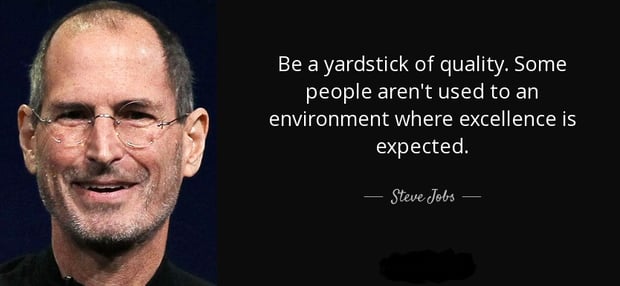Learning from a legend
Looking through YouTube the other day (what a fantastic resource YouTube is for quality!), I stumbled across a video of Steve Jobs from the 1990s talking about Quality and Joseph Juran.
Like you, I have seen Jobs on his famous platform launching iMacs, iPhones, iPads, iOS and the like. I love Apple products - our family has 6 iPads, 4 iPhones, several iPods and an Apple TV. I know first-hand that Apple designs great devices. But what I didn’t know was that Jobs had a deep understanding of quality principles, nor was I aware that he had used the teachings of Juran as a cornerstone for both his Next and Apple organisations.
When he was president of Next Computer Inc, Jobs and his team started researching quality to “see what all the ballyhoo was about”. Through this time period Jobs had contact with many quality leaders, but it was Dr Juran who really impressed him with his down-to-earth, scientific approach to quality. Juran visited Next several times and Jobs was taken with how simple and powerful his messages were.

One of the key messages that Jobs took on board was that quality is built in from the engineers all the way through to supporting the customer. It can’t be inspected in by QC during production. It’s not the sole responsibility of the manufacturing department. It can’t be forgotten about once the truck leaves the factory. It has to be embedded in every link of the chain.
Jobs also admired that way Juran would treat everyone he met in the same, respectful way, whether they be presidents, executives, janitors or assembly workers. Juran was an excellent listener who was always very interested in the point of view of the person he was talking with. This approach was indicative of the fact that great products aren’t created by people working alone, but by people operating in teams. Jobs said Juran was both caring and straightforward, with an optimistic view of human nature, what Jobs called “optimistic humanism’. As Jobs put it, “Give people the opportunity to change and improve and they will”.
Question Everything
Another lesson Jobs learnt from Juran was to question everything. For example, when Apple commenced production there was a cost that was always automatically built in. Jobs questioned why this was so and was told “we have always done it that way”. He kept questioning until he found out the real reason why they built in this cost – there wasn’t enough computer processing power to work out the actual cost, so they just used an estimate, probably a wildly inaccurate one. Jobs solved that problem by designing a piece of software that brought all of the pieces together. Thus the company was able to move from random, expensive guesswork to cost accounting.
If it is good enough for Steve Jobs to ask what can sometimes be construed as “numpty” questions, then I believe it is good enough for all of us to do it. Question everything. Question beliefs. Never settle for the answer “we have always done it that way” because that’s not actually an answer at all, it’s an unthinking belief. Dig, and keep digging. Jobs said that we need to approach processes scientifically – in other words, to look for the theory behind what is being done. Keep questioning until someone can describe why they are doing things a particular way. Then you know you’ve hit paydirt.
So is Jobs someone we should bother listening to? To my mind Jobs probably did more to change the way we all work and play than any other single person in the last 20 years. He took a struggling company and turned it around. He once said, “A lot of companies have chosen to downsize, and maybe that was the right thing for them. We chose a different path. Our belief was that if we kept putting great products in front of customers, they would continue to open their wallets”. He was absolutely right, and the fact that Apple has more money in the bank than NZ’s GDP is evidence of this. So yes, he’s definitely worth a listen.
Takeaway
So what are the takeaways from Steve Jobs and Quality:
- Keep your messages simple.
- Question everything.
- Keep questioning until you get to the theory behind the process.
- Given the opportunity, everyone in your organisation can contribute insights that make your business run better. Make sure you give them that opportunity, often.
.png?width=200&height=51&name=image%20(2).png)




